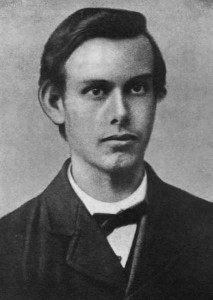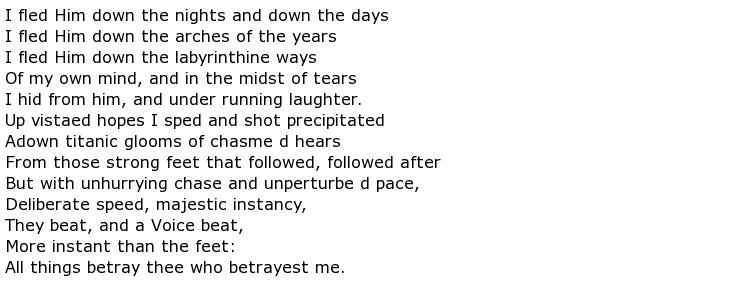 Born in Lancashire in 1859, Francis Thompson was a colorful character best known for his poem The Hound of Heaven. He spent a period of time as a vagrant and opium addict and even attempted to commit suicide before getting his life back together at a priory in Storrington. Even though he discovered some success with his poetry in later years, he lived most of his life struggling to make ends meet.
Born in Lancashire in 1859, Francis Thompson was a colorful character best known for his poem The Hound of Heaven. He spent a period of time as a vagrant and opium addict and even attempted to commit suicide before getting his life back together at a priory in Storrington. Even though he discovered some success with his poetry in later years, he lived most of his life struggling to make ends meet.
Thompson was the son of a doctor and initially went to what is now Manchester University to study medicine himself, though he rarely took it seriously and eventually left to pursue a career in London. He hoped to be a writer but was initially disappointed and ended up selling newspapers and matches on the street. For most of his life he suffered from ill health and, in London, he became addicted to opium.
Sleeping rough on the streets, he was spiraling down into a world of despair and attempted to commit suicide. Taken in by a prostitute who gave him a share of the money she earned, Thompson later said that she had saved him from a desperate end. In 1888, his luck changed a little when some of his poetry was published in Merrie England, a small press literary magazine of the time. The publication was run by a couple who, judging that he had some talent, decided to send him to the Our Lady of England Priory to recover from his opium addiction.
The poem The Hound of Heaven was often recited by school children in the years after Thompson’s death, a tale of a lost soul being pursued by God. The poem is all the more startling in that he was such a troubled person, still battling his addiction and ill health. Between 1893 and ’97, he published three collections including Poems, Sister Songs and New Poems.

Poems attracted attention immediately and included the work The Hound of Heaven, which was adored by many critics of the time, and The Kingdom of God. Among those who were enamored of his work were the fantasy novelist and poet J.R.R. Tolkien and G.K. Chesterton who thought his death was a huge loss to the world of poetry.
It is often said that Thompson combined the detached passion of Shelley with the raw emotion of Crashaw and that most of his inspiration came from the hardships of his life when he was a slave to opium and virtually penniless on the streets of London. He was often seen as the poet’s poet, a sensitive man who used sharp imagery. His collection Sister Songs was written in appreciation of the children of his mentors and saviors, the Meynells, and garnered as much praise as his first work.

It is true to say though, that the poet struggled for most of his life from debilitating health problems and his early addiction to opiates. In later years he suffered from tuberculosis and in 1907 it took his life. Thompson was 47 at the time.

